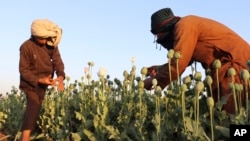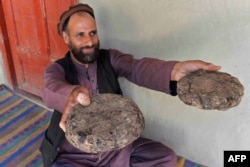The Taliban have outlawed cultivation of drugs, including opium poppy, across Afghanistan, the world’s biggest opium producer, which accounts for 85 percent of global production.
A decree issued Sunday by the ruling Islamist group’s reclusive supreme leader, Haibatullah Akhundzada, also banned the production, usage, transportation, trade, export and import of all other drugs.
“If anyone violates the decree, the crop will be destroyed immediately and the violator will be treated according to the Sharia law,” according to the order announced by the Taliban Interior Ministry at a news conference in Kabul.
The hardline group seized power from the now-defunct Western-backed government days before the United States and NATO-led foreign troops withdrew from Afghanistan in August.
Since then, the Taliban have been under pressure from neighboring and regional countries to combat the production as well as trafficking of drugs.
The opium harvest in Afghanistan increased by 8 percent in 2021, compared to last year, to 6.800 tons, according to a report that the United Nations Office on Drugs and Crimes (UNODC) released in November.
The report warned that the output could lead to markets around the globe being flooded with around 320 tons of pure heroin trafficked from the country.
The UNODC estimated in its report that income from Afghan opiates amounted to $1.8- to $2.7 billion in 2021 inside Afghanistan, but much larger profits are made in the illicit drug supply chains outside the country.
Afghanistan’s humanitarian crisis and economic upheavals have worsened since the withdrawal of Western troops after 20 years.
Years of war, persistent drought and financial sanctions imposed on the Taliban after the withdrawal of foreign troops are blamed for the unprecedented increase in humanitarian needs in the South Asian nation.
Analysts say the dire economic conditions have prompted many Afghan farmers lately to stop growing legal crops such as wheat and instead cultivate the illicit opium poppy crops because it brings faster and higher returns.
The Taliban had banned poppy growing when they were previously in control of Afghanistan from 1996 to 2001 and the move had significantly reduced the harvest, according to the UNODC estimates at the time.
The removal of the Islamist group from power by the U.S.-led military invasion of the country after the September 2001 attacks on the United States led to a resurgence in opium poppy cultivation despite billions of dollars of investment by Washington to help Afghan authorities combat narcotics production.
A U.S. government watchdog documented in a recent report that Washington spent “nearly $9 billion on counternarcotics efforts since 2002, in part due to concerns that trafficking funded” the Taliban insurgency at the time.
“Despite the investment, the cultivation of opium poppy in Afghanistan has trended upward for two decades, and insecurity has made it difficult to reverse the growth,” said the report by the Special Inspector General for Afghanistan Reconstruction, or SIGAR.





